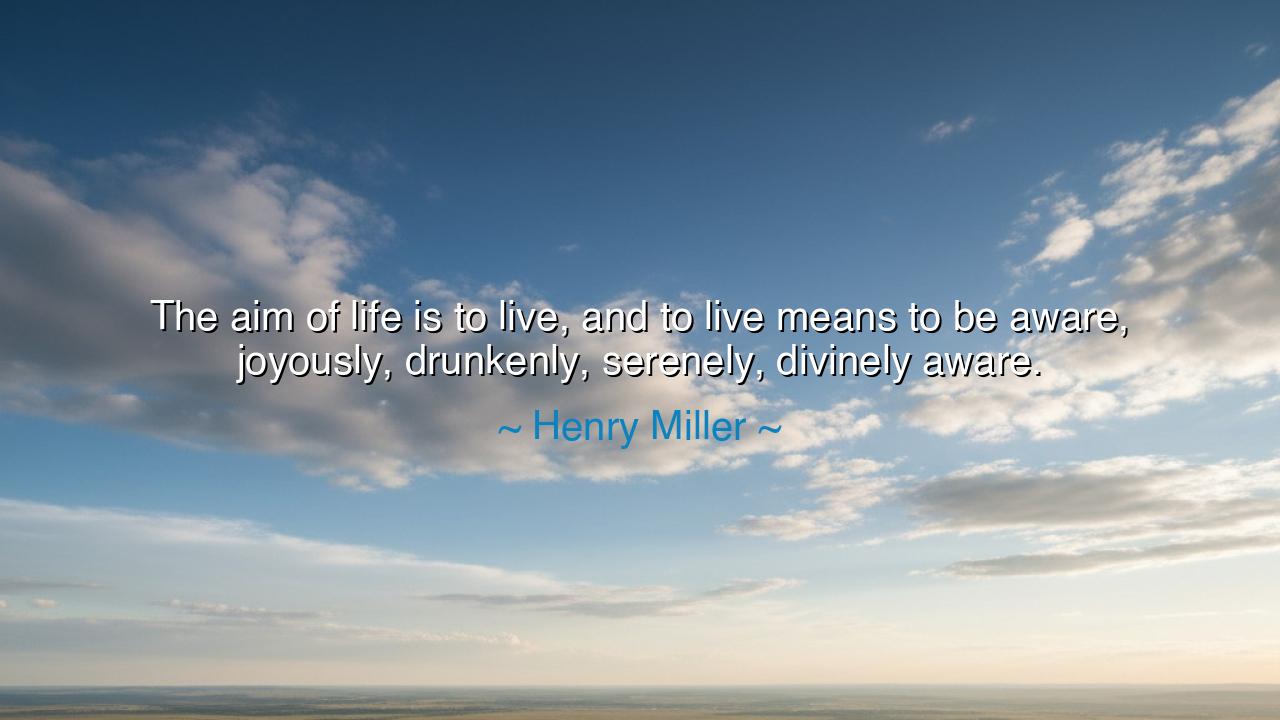
The aim of life is to live, and to live means to be aware
The aim of life is to live, and to live means to be aware, joyously, drunkenly, serenely, divinely aware.






“The aim of life is to live, and to live means to be aware, joyously, drunkenly, serenely, divinely aware.” – Henry Miller
In these luminous words, Henry Miller, the restless seeker of life’s essence, tears away the dull veils that cloud human existence. He speaks not as a scholar, nor as a preacher, but as one who has tasted both ecstasy and despair and found, in the depths of experience, the truth of being. When he says the aim of life is to live, he is not uttering a tautology; he is sounding an alarm. For how many walk the earth asleep, breathing yet not alive, surrounded by wonder yet blind to it? Miller’s cry is for awareness—not cold observation, but the burning, all-consuming kind that makes each moment throb with meaning.
The origin of this thought lies in the ancient lineage of mystics and poets who saw life not as a puzzle to be solved, but as a song to be sung. The Buddha spoke of awakening, of seeing the world as it truly is; the Sufi poets called it intoxication with the divine; the Greeks, too, revered gnosis—the living knowledge of existence. Miller, standing in this same stream, turned these timeless insights into the language of the modern soul. His words remind us that to live is not to measure time, but to feel it—to be aware, not timidly, but joyously, drunkenly, serenely, divinely aware.
To be joyously aware is to meet the world with open arms, to recognize beauty even in the ordinary. The sunlight on a wall, the laughter of a stranger, the scent of rain—these are not small things, but fragments of eternity made visible. To be drunkenly aware is to surrender control, to let wonder intoxicate the heart until reason falls silent. It is to live as a lover lives, each breath a confession of passion for existence itself. Yet awareness must also be serene, for the world is not all ecstasy; it is also shadow, pain, and silence. True living embraces both—the fire and the stillness, the laughter and the tears. Finally, Miller calls it divinely aware, for in that fullness of consciousness we glimpse the sacredness in all things, the pulse of the infinite beating within the finite.
Consider the story of Vincent van Gogh, the mad saint of color and light. Though tormented by poverty and loneliness, he lived more vividly than those who pitied him. Each brushstroke he laid upon canvas was an act of holy awareness. He saw divinity in a field of wheat, in a starry sky, in the face of a peasant. His life was not comfortable—but it was alive, gloriously so. He was joyous in vision, drunken with color, serene in devotion, and divine in his awareness. The world called him insane; time called him immortal.
This, then, is Miller’s challenge: to awaken to life in all its dimensions. To live does not mean merely to exist, to eat and sleep and labor, but to burn with perception—to feel the world pressing against your soul and to say “yes” to it. Awareness is the bridge between existence and meaning. Without it, even pleasure turns to dust; with it, even sorrow becomes luminous. The aim of life is not comfort, but consciousness—not to escape reality, but to embrace it until you and it are one.
Let the listener take this wisdom into the marrow of their being. Do not move through your days as though they were tasks to endure. Stop, breathe, behold. Look upon the world not with weary eyes, but with wonder renewed each dawn. Let your mind drink from the cup of the present moment until it overflows with gratitude. In the humblest hour—washing your hands, walking the street, hearing a bird—let yourself be divinely aware that you are alive, that you are part of the great cosmic song.
For the greatest tragedy is not death, but the unlived life. To live as Miller urges is to be a flame—burning, changing, perceiving, rejoicing. When your final day comes, may you not say “I have existed,” but rather “I have lived, and I have been aware.” For in that awareness lies the essence of the divine, and in that divine awareness lies the meaning of it all.






AAdministratorAdministrator
Welcome, honored guests. Please leave a comment, we will respond soon